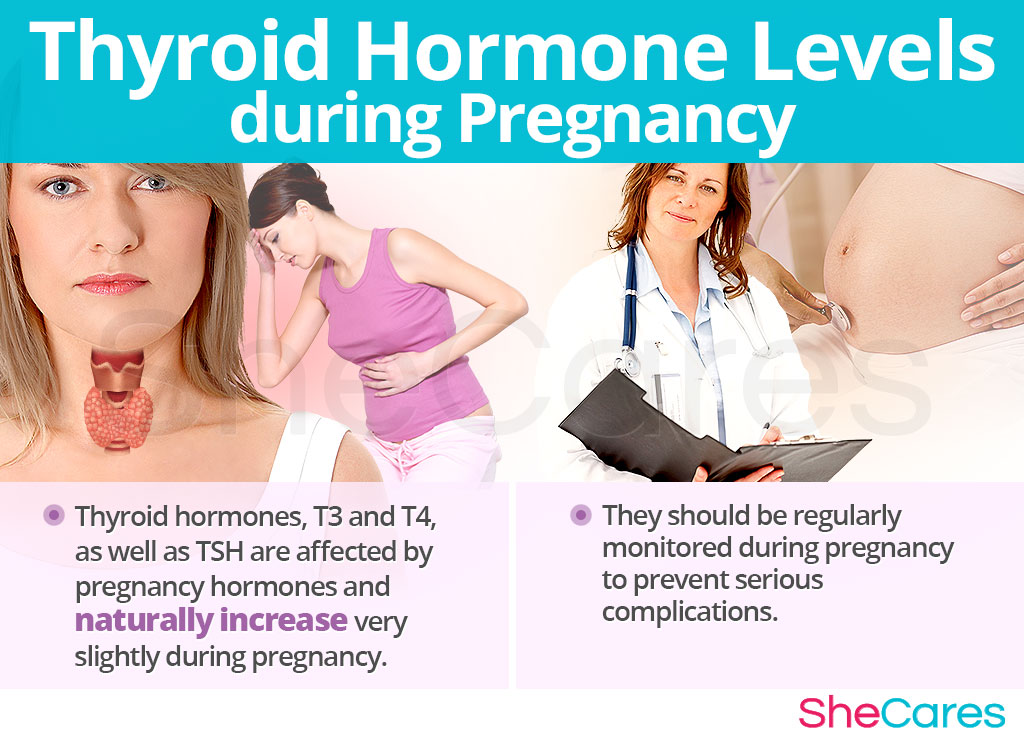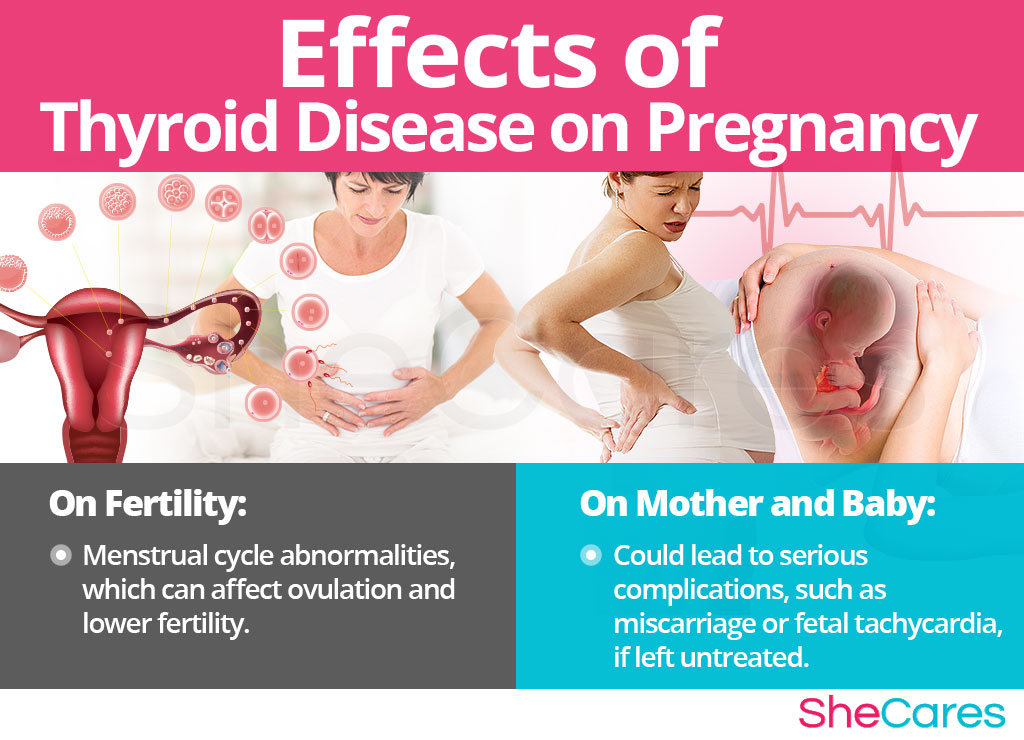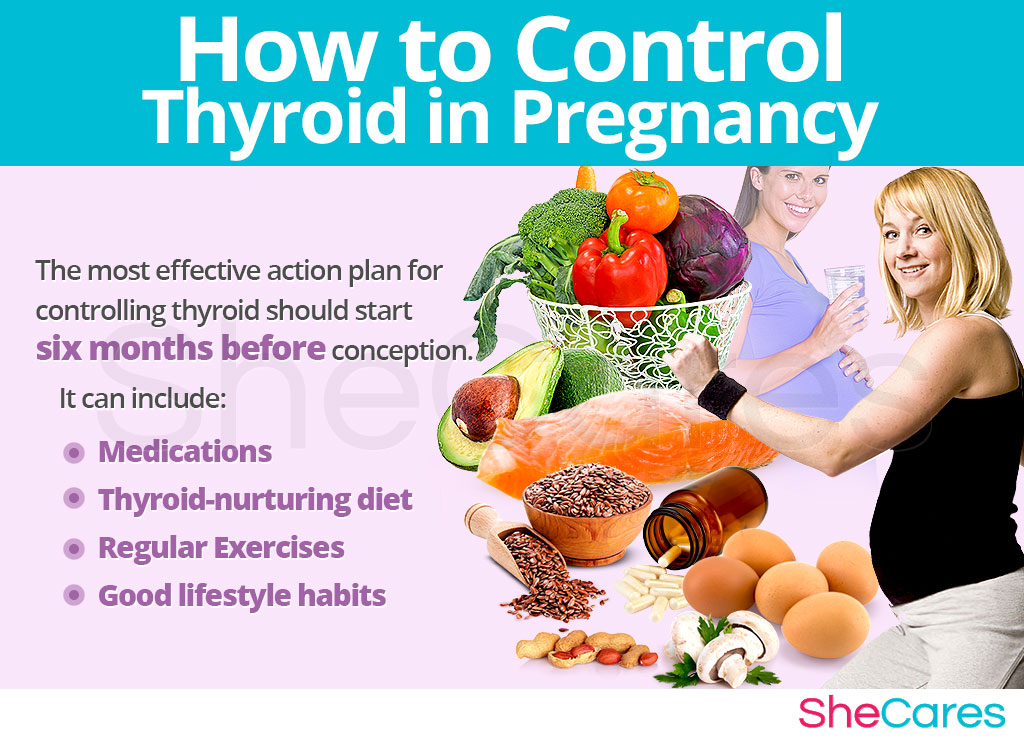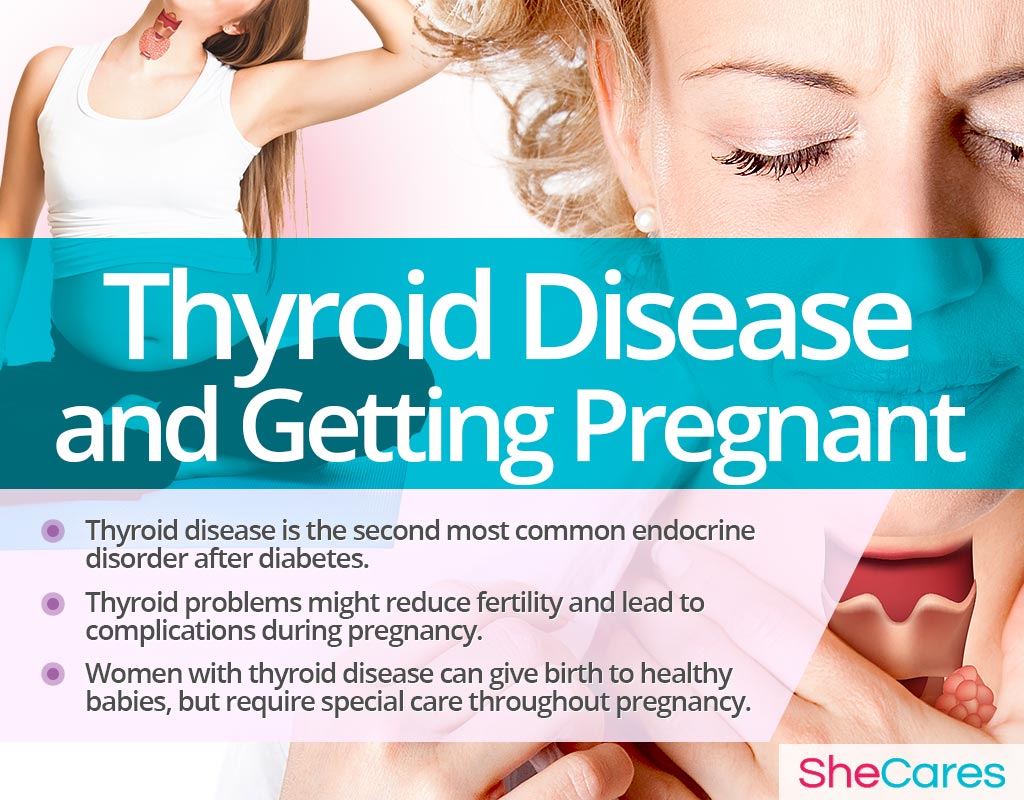Brief Overview of Thyroid Disease
The thyroid gland is an important organ located in the front of the neck, which releases hormones, called T3, T4, and TSH, responsible for regulating metabolism, heart rate, and nervous system functions among many others.
When there is too much of them in the blood, the thyroid is overactive, whereas low levels of thyroid hormones make the gland underactive. These hormones play an important role during pregnancy as well, and their imbalance might affect both the baby and the mother.
Thyroid Hormone Levels during Pregnancy
During pregnancy, the normal range of TSH, T3, and T4 is slightly increased by the pregnancy-related hormones, estrogen and human chorionic gonadotropin (hCG). It is, therefore, very important for women with hyper- or hypothyroidism to reach stable thyroid hormone levels prior to getting pregnant in order to prevent complications.

Types of Thyroid Problems and Pregnancy
The most common types of thyroid disease that have to be properly managed before getting pregnant are:
Hyperthyroidism, an overactive thyroid, characterized by high thyroid hormones and low TSH. It is most commonly caused by an autoimmune disease called Graves' disease.
Hypothyroidism, an underactive thyroid, characterized by low thyroid hormones and high TSH. It is most commonly caused by an autoimmune disease called Hashimoto's disease.
Effects of Thyroid Disease on Conceiving and Pregnancy
Thyroid and Fertility
Abnormally high or low levels of thyroid hormones and TSH have been shown to cause menstrual cycle irregularities, thus making conception challenging.
Thyroid and Pregnancy
Poorly controlled thyroid disease might lead to potentially serious complications, including preeclampsia, premature birth, or miscarriage. An over- or underactive thyroid during pregnancy might also affect the baby and inhibit its development.

How to Control Thyroid in Pregnancy
The most effective strategy to control thyroid disease during pregnancy is starting your pre-conception preparations at least six months before getting pregnant. It involves creating a thorough action plan, which focuses on reducing hormonal imbalance, resolving menstrual irregularities, and optimizing your fertility in a variety of ways:
Medications
Thyroid-friendly diet
Regular exercise
Healthy lifestyle habits
Read more about preparing for pregnancy with hyperthyroidism and hypothyroidism.

Key Takeaways
It is a serious dilemma for many women of childbearing age: how to get pregnant with thyroid problems. Studies revealing the link between the thyroid and infertility or pregnancy complications can surely cause a lot of stress and emotional disturbance. Fortunately, women suffering from endocrine issues can successfully get pregnant and - with proper management -reduce the negative effects of their disorder on their babies to a minimum.
Sources
- American Thyroid Association. (n.d.). Pregnancy and Thyroid Disease. Retrieved November 24, 2017 from https://www.thyroid.org/thyroid-disease-pregnancy/
- British Thyroid Foundation. (2015). Pregnancy and Fertility in Thyroid Disorders. Retrieved November 24, 2017 from http://www.btf-thyroid.org/information/leaflets/38-pregnancy-and-fertility-guide
- Indian Journal of Endocrinology and Metabolism. (2012). Hypothyroidism in pregnancy. Retrieved November 24, 2017 from https://www.ncbi.nlm.nih.gov/pmc/articles/PMC3354841/
- Iranian Journal of Reproductive Medicine. (2015). Thyroid dysfunction and pregnancy outcomes. Retrieved November 24, 2017 from https://www.ncbi.nlm.nih.gov/pmc/articles/PMC4609317/
- Journal of Human Reproductive Sciences. (2011). Thyroid and its indispensability in fertility. Retrieved November 24, 2017 from https://www.ncbi.nlm.nih.gov/pmc/articles/PMC3136077/
- March of Dimes. (n.d.). Thyroid conditions. Retrieved November 24, 2017 from https://www.marchofdimes.org/complications/thyroid-conditions.aspx
- National Institute of Diabetes and Digestive and Kidney Diseases. (2012). Pregnancy & Thyroid Disease. Retrieved November 24, 2017 from https://www.niddk.nih.gov/health-information/endocrine-diseases/pregnancy-thyroid-disease
- Therapeutic Drug Monitoring. (2006). Thyroid Function Testing in Pregnancy and Thyroid Disease: Trimester-specific Reference Intervals. Retrieved November 24, 2017 from https://www.ncbi.nlm.nih.gov/pmc/articles/PMC3625634/
Footnotes:
Journal of the Endocrine System. (2018). Does Sex Bias Play a Role for Dissatisfied Patients With Hypothyroidism? Retrieved September 15, 2022 from https://www.ncbi.nlm.nih.gov/pmc/articles/PMC6077803/


